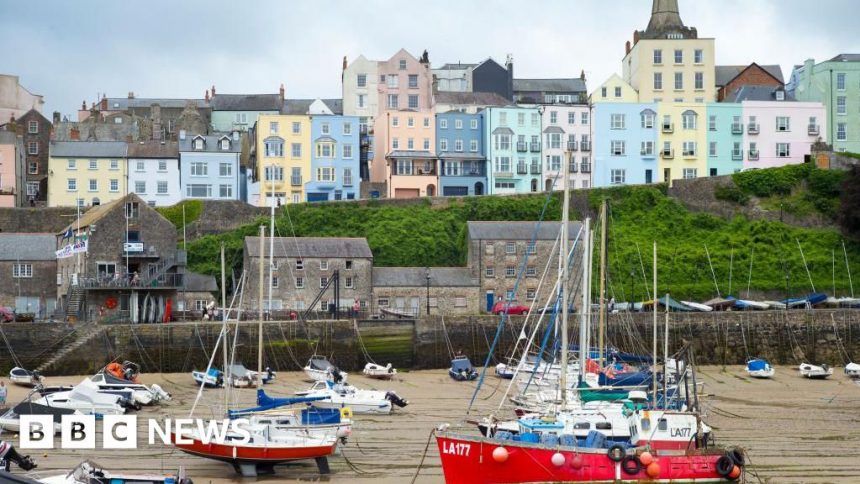Tourism hotspot cuts council tax on second homes
 Getty Images
Getty ImagesOne of Wales’ tourism hotspots has voted to make it cheaper to own a second home.
Pembrokeshire councillors have agreed to reduce the council tax premium on second homes to 150%, just six months after a higher rate of 200% was introduced.
It comes despite warnings that it would lead to greater cuts to council services and a higher council tax rise for ratepayers in the county.
It comes despite new Welsh government rules aimed at making it easier for people to buy homes where they grew up, with powers given to councils to charge a second home council tax premium of up to 300% on top of the normal rate.
But many Pembrokeshire councillors voiced their concerns over the financial impact of the cut, as it could add a further £2.6m in cost pressures to an authority already facing a funding gap of more than £30m.
The independent amendment by councillor Huw Murphy to reduce the premium to 150% was supported by 30 votes to 26.
Council leader Jon Harvey said the data did not yet exist to assess the impact of the 200% second homes premium but that every 50% cut in the premium would equate to £2.6m in lost income.
Mr Harvey also called into question which additional services would be cut to compensate for the reduction.
Labour councillor Marc Tierney said it was “disappointing that people were unwilling to listen to the the economic reality” and described the premium cut as a “very bad decision”.
A previous Conservative amendment by councillor Di Clements to reduce the council tax premium for second homes from 200% to 100% was rejected.
The new 150% premium will apply from next April.
 Getty Images
Getty ImagesMany businesses in the Pembrokeshire town of Tenby welcomed the decision.
Becky Munn, who has been running her shop Cariads since September, described the 200% as “incredibly high” and said she had seen a “huge increase” in properties that are second homes going up for sale as a result.
Owners could avoid paying the premium for up to a year by putting their homes up for sale, which many chose to do as second homes for sale in Pembrokeshire have trebled since 2023.
“The less properties that are available for people to come and visit the area, it takes away the opportunity for people to spend money in the area,” she said.
Ms Munn, who lives in Milford Haven, said she would like to live in Tenby to be nearer her business but could not afford a family home in the area.
As a local person, and business owner, she said it feels like a “Catch-22 situation”.

John Mather, owner of The Nook in Tenby, called any premium on second home owners “unfair”.
“We have great holidaymakers who are here all through the long season but we have peaks and troughs,” he said. “In those troughs the second home owners do spend well in town.”
Matthew Ronowitz, who owns a restaurant in the centre of Tenby, said second home owners were “a big chunk of our trade.”
“I think it’s a good U-turn, if they would have gone any further they would have seen the effects on the local economy and the tourism trade in the area.”

Councillor Rhys Jordan from St Florence blamed the “huge surge” in properties for sale on the 200% premium.
He said they were generally one or two bedroom apartments not “suitable” for locals and claimed the council had been “too hasty” in bringing in the premium.
Mr Jordan also claimed that tourism and hospitality businesses were reporting a reduction of 40-60% this season.
His views were echoed by councillor Bethan Price, who said her area, St Davids, had been “a lot quieter” and did not benefit from the money raised by the premium.
But councillor Michelle Bateman said she could not support the cut as councillors “cannot keep burying their heads in the sand over the financial situation.”
Tourism body Visit Pembrokeshire welcomed the decision as it said as tourism businesses had been hit “by the 182-day Welsh government policy, some to such an extent their businesses have been at risk of becoming unviable“, and added: “It’s very good news to learn that their voices have been heard.”
The council voted to support a recommendation to write to the Welsh government asking it to reduce the 182 days let threshold by which self-catering properties qualify for non-domestic rates.
The decision on whether to increase the premium for long-term empty properties was deferred until the December council meeting.






